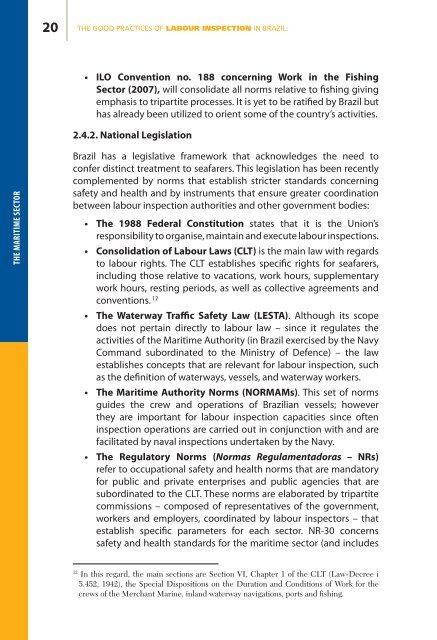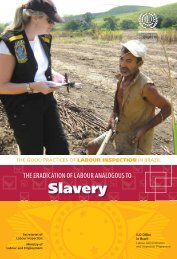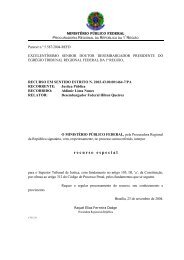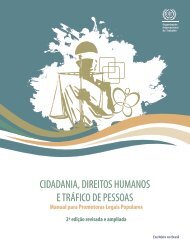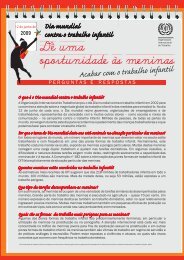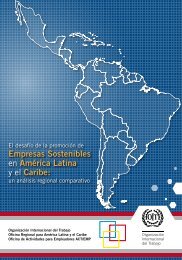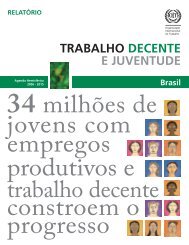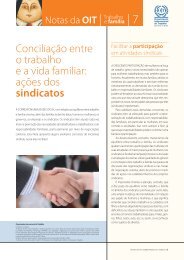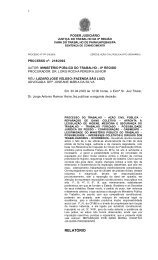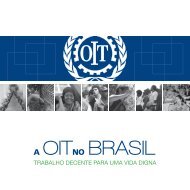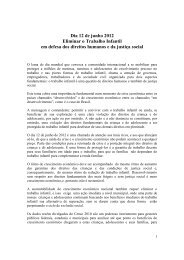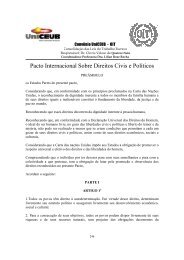The Maritime Sector
The Maritime Sector
The Maritime Sector
You also want an ePaper? Increase the reach of your titles
YUMPU automatically turns print PDFs into web optimized ePapers that Google loves.
20THE GOOD PRACTICES OF LABOUR INSPECTION IN BRAZIL:• ILO Convention no. 188 concerning Work in the Fishing<strong>Sector</strong> (2007), will consolidate all norms relative to fishing givingemphasis to tripartite processes. It is yet to be ratified by Brazil buthas already been utilized to orient some of the country’s activities.2.4.2. National LegislationTHE MARITIME SECTORBrazil has a legislative framework that acknowledges the need toconfer distinct treatment to seafarers. This legislation has been recentlycomplemented by norms that establish stricter standards concerningsafety and health and by instruments that ensure greater coordinationbetween labour inspection authorities and other government bodies:• <strong>The</strong> 1988 Federal Constitution states that it is the Union’sresponsibility to organise, maintain and execute labour inspections.• Consolidation of Labour Laws (CLT) is the main law with regardsto labour rights. <strong>The</strong> CLT establishes specific rights for seafarers,including those relative to vacations, work hours, supplementarywork hours, resting periods, as well as collective agreements andconventions. 12• <strong>The</strong> Waterway Traffic Safety Law (LESTA). Although its scopedoes not pertain directly to labour law – since it regulates theactivities of the <strong>Maritime</strong> Authority (in Brazil exercised by the NavyCommand subordinated to the Ministry of Defence) – the lawestablishes concepts that are relevant for labour inspection, suchas the definition of waterways, vessels, and waterway workers.• <strong>The</strong> <strong>Maritime</strong> Authority Norms (NORMAMs). This set of normsguides the crew and operations of Brazilian vessels; howeverthey are important for labour inspection capacities since ofteninspection operations are carried out in conjunction with and arefacilitated by naval inspections undertaken by the Navy.• <strong>The</strong> Regulatory Norms (Normas Regulamentadoras – NRs)refer to occupational safety and health norms that are mandatoryfor public and private enterprises and public agencies that aresubordinated to the CLT. <strong>The</strong>se norms are elaborated by tripartitecommissions – composed of representatives of the government,workers and employers, coordinated by labour inspectors – thatestablish specific parameters for each sector. NR-30 concernssafety and health standards for the maritime sector (and includes12In this regard, the main sections are Section VI, Chapter 1 of the CLT (Law-Decree i5.452, 1942), the Special Dispositions on the Duration and Conditions of Work for thecrews of the Merchant Marine, inland waterway navigations, ports and fishing.


